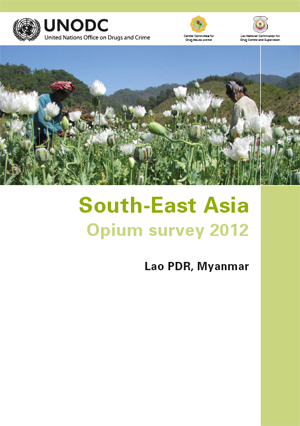In the urban areas, political and social reforms are plainly visible to everyone. But in the rural areas, the military is still riding roughshod over the people as before the reforms. In some areas, the rights situation is getting even worse.
 On the military field, the government has signed ceasefire pacts with 13 armed opposition movements between September 2011 and 25 August 2012. But the military keeps pushing on with its “area clearing” and “area control” operations, leading to around 100 clashes with the Karen and Shan forces that have concluded ceasefires.
On the military field, the government has signed ceasefire pacts with 13 armed opposition movements between September 2011 and 25 August 2012. But the military keeps pushing on with its “area clearing” and “area control” operations, leading to around 100 clashes with the Karen and Shan forces that have concluded ceasefires.
On the drug front, circumstances are still the same. The government, according to UN Office on Drugs and Crime (UNODC), has been developing a 3 year plan to help the poppy farmers, estimated at 300,000 families, move toward alternative livelihoods. But the military is exhorting farmers to grow more. “If you don’t grow, how else can you have money to feed us, the Burmese army and the Shan rebels?” one militia officer in eastern Shan State reportedly told villagers during the last season.
As a result, a Lahu Christian pastor, even though it went against his grain to grow poppies, has become a poppy farmer. “He said he had to do it to have enough money to pay tax to the military and the local PMF (People’s Militia Force formed by the army), which is 500,000 kyat ($ 500) per household,” said a Lahu representative at a recent meeting held in Chiangmai. (The PMF collects taxes and shares them with the military).
A representative from Kayan area in western Shan State agreed. During the 2010 elections, candidates from the (military-backed) Union Solidarity and Development Party promised people would be allowed to grow poppies if they were elected, echoing reports received by SHAN earlier. “It is now distributing leaflets attacking the KNLP (Kayan New Land Party that concluded ceasefire in 1994), that it is the group that is opposing poppy cultivation,” he said. “Which is of course ridiculously untrue. How can a movement whose survival depends on the goodwill of the people go against them?”
The same situation is witnessed in areas further east where the Shan State Army (SSA) South is active. In an obvious attempt to wrest moral support from the rebels to the Burmese military, the local PMFs have been telling the people it is the SSA and not the government that is against opium production. (One relative of a farmer was so upset he wrote to the SSA via SHAN: Why should ginger be hot, instead of chili?)
One of the outcomes was acknowledgement by not a few drug enforcement officials that, without the military on board, the fight against drugs is hopeless.
One example is the recent meeting of the Central Committee for Drug Abuse Control (CCDAC), UNODC and the SSA South in Tachilek. The resultant agreement is to start at a low level: To choose suitable sites in two townships to launch joint crop substitution pilot projects.
Nothing was said about key players in the drug trade (most of whom are allies of the military) and how to deal with them. Everyone was also careful not to mention that it is the political settlement between the government and the armed opposition that will resolve the drug problem.
But I may be too pessimistic. Maybe the government and the military are not playing ‘good cop’ and ‘bad cop’ against the struggle for equality by the non-Burmans. However, if they are not so and they are really at odds with each other, the government should let the opposition, both armed and unarmed, know so it could render effective assistance. No doubt part of the military will also be against its empire-building aspirations.
Only then we will see the real beginning of the end to the drug problem and not just the window-dressings – spectacular seizures and arrests that is doing nothing to end it – that have been displayed to us for so long.



